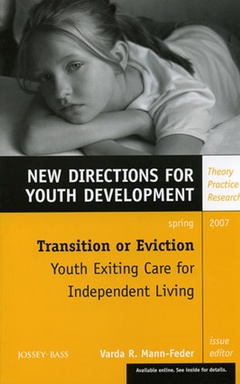Transition or eviction: youth exiting care for independent living: new directions for youth development number 113 New Directions for Youth Development, Number 113 J–B MHS Single Issue Mental Health Services Series
Coordonnateur : Mann–Feder Varda R.

Executive Summary.
1. Youth leaving care: How do they fare? (Anne Tweddle)
This chapter provides an overview of recent international research examining outcomes for youth after they age out of the child welfare system. It outlines recommendations for changes to practices and policies in facilitating the transition to independence.
2. The transition from state care to adulthood: International examples of best practices (Carrie Reid)
In order for youth to be prepared for the transition to adulthood, they must have key areas of their lives addressed: relationships, education, housing, life skills, identity, youth engagement, emotional healing, and adequate financial support. Successful and innovative programs for transition aged youth in the United States, United Kingdom, and Australia are highlighted.
3. The role of housing in the transition process of youth and young adults: A twenty year perspective (Mark J. Kroner)
Lighthouse Youth Services is a large housing based independent living preparation program that has served over thirteen hundred youth and their children since 1986. This chapter describes housing options and basic program strategies, common problems, funding issues, and general outcomes for youth. The system characteristics necessary to make a program work are outlined, as well as key lessons learned.
4. Transition without status: The experience of youth leaving care without Canadian citizenship (Francis G. Hare)
Youth in transition from care sometimes lack legal status or citizenship. This may occur when a child arrived from another country alone or arrived with a family but was taken into care before status issues were resolved. The chapter examines the dimensions of this issue and the ways in which youth, service providers, and others have been working to minimize the numbers of young people who leave care without citizenship status.
5. Promoting autonomous functioning among youth in care: A program evaluation (Martin Goyette)
This chapter describes a provincially funded program in Quebec that incorporates elements unique in the local child welfare system and preliminary findings on its impact. The program targets youth sixteen years of age and older who have had little family support, have exhibited high risk behaviors, and are in the transition to independent living.
6. Juvenile offenders and independent living: An Irish perspective on program development with St. Xaviers (Niall McElwee, Michael OConnor, Susan McKenna)
The chapter views a specific population within the Irish social care system and draws from the authors collective experience in relation to young offenders leaving care. Effective program development for youth leaving care for independent living is considered crucial to potential long term success and permeates all good practice.
7. The Scottish perspective: A pathway to progress? (Jeremy Millar)
This chapter offers insight into the impact of reforms in terms of both direct work with care leavers in the northeast of Scotland and the broader aspirations of the new legislative framework. The author describes how the historical context that links Scotland to the Commonwealth (in terms of former approaches to practice and societal and demographic changes) have influenced practice and policymaking in this area.
8. Using youth expertise at all levels: The essential resource for effective child welfare practice (Kathi M. Crowe)
Engaging youth as resources in all levels of child welfare work not only represents best practice, it is an essential ingred
Date de parution : 07-2007
Ouvrage de 176 p.
16.6x22.8 cm



